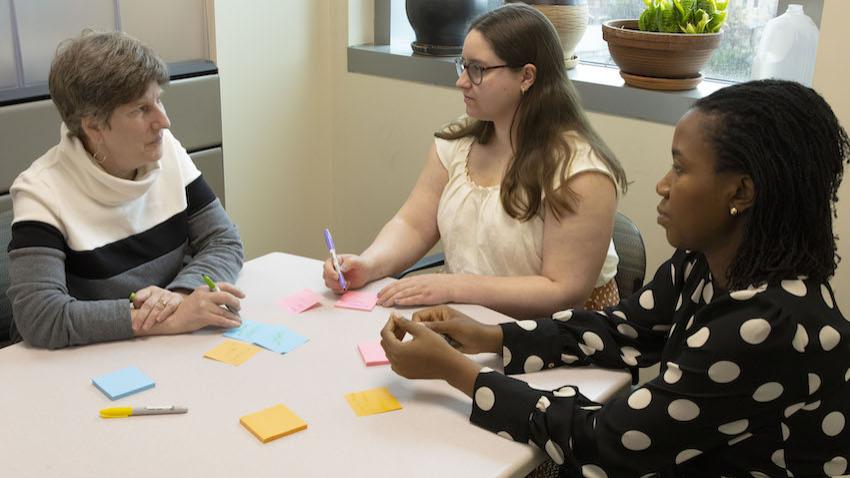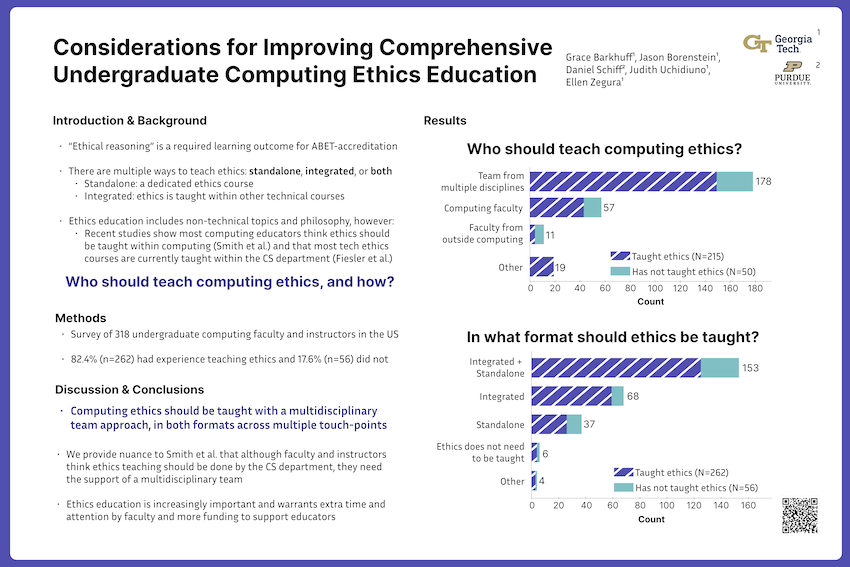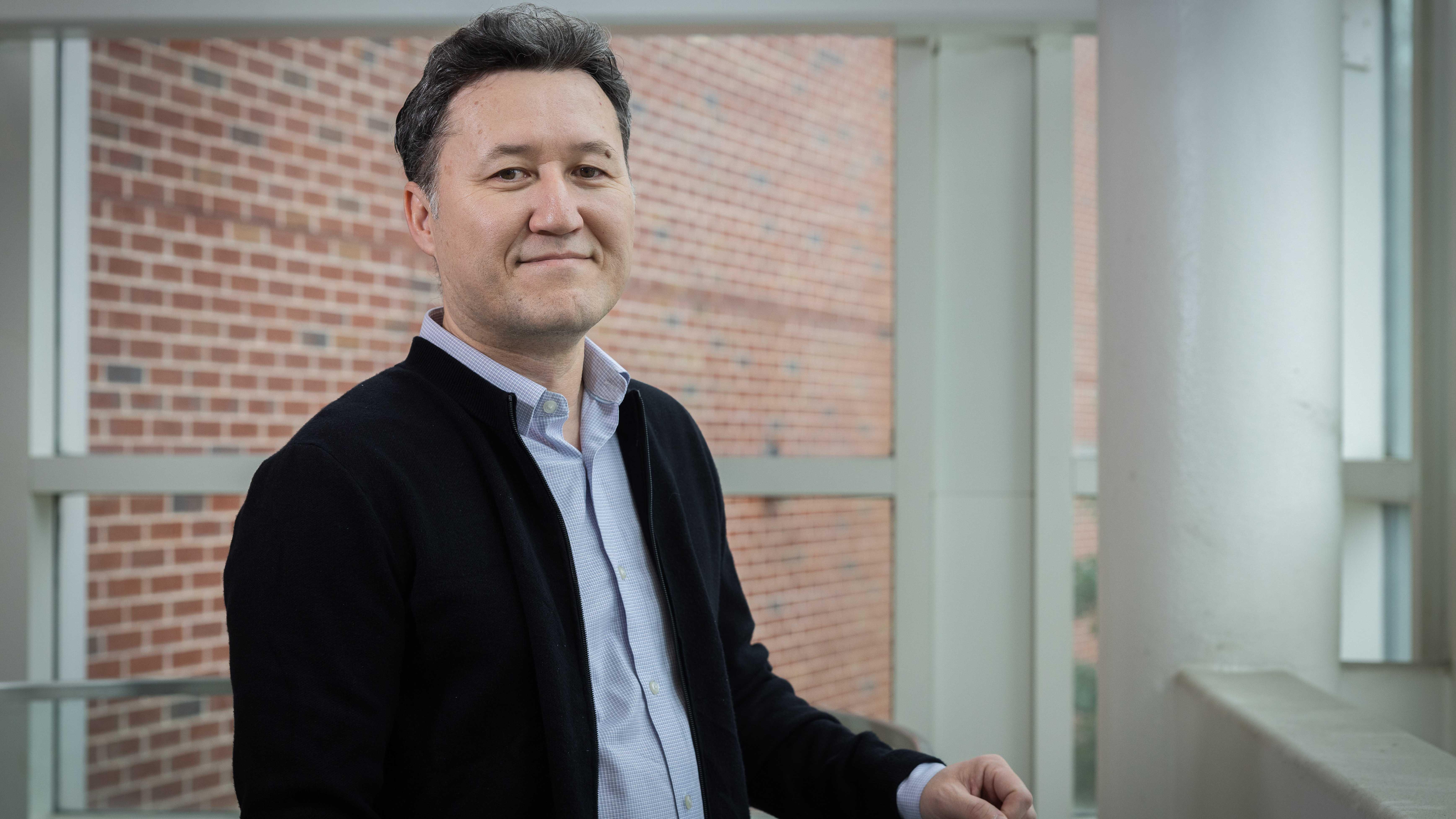
Surveys Show High Demand for Ethics in Computer Science Programs
Two surveys conducted by Georgia Tech researchers uncovered a pressing need and a demand for ethics to be taught more broadly in computer science programs nationwide.
Grace Barkhuff, a Ph.D. student in human-centered computing, is leading two studies of how ethics is taught at the undergraduate and master’s levels in computing programs.
Both studies were accepted into the poster sessions at the 2024 Technical Symposium on Computer Science Education (SIGCSE TS), in Portland, Oregon, March 20-23.
Barkhuff’s undergraduate curriculum study found that educators within a computer science department typically teach ethics in computing courses. However, the consensus opinion that Barkhuff gathered from more than 300 educators suggests a preference for multi-disciplinary teams of instructors to teach these classes.
A Multi-disciplinary Approach
Barkhuff believes these findings follow from the fact that ethics encompasses a broad range of disciplines, including the humanities.
A multi-disciplinary approach to teaching ethics in CS could be as simple as a CS instructor inviting a humanities instructor as a guest lecturer. Another approach would be for two or more instructors from different departments co-teaching an ethics course.
Whichever approach is taken, Judith Uchidiuno, an assistant professor in the School of Interactive Computing who mentors Barkhuff, said faculty will need administrative support.
“Courses are generally taught by one department, so how do you structure a course collaboratively and equitably?” she said. “I could easily reach out to other faculty and ask them to be a guest lecturer in my class, and that would be fine. But for it to be a more long-term, sustainable endeavor, computer science departments need to recognize the importance of ethics.”

Barkhuff’s survey shows strong support for ethics to be taught in a standalone class and integrated across the curriculum.
“This would mean there would be a course specifically dedicated to teaching ethics, and then you have other technical classes like in algorithms or data structures, and they’d have a dedicated module on ethics where it’s relevant to those topics in those courses,” she said.
The fact that other fields have incorporated ethics into the curriculum gives computer science precedence to do the same. However, there is still resistance, Barkhuff said.
She attributes that resistance to several factors:
- Current educators may not have had ethics taught to them when they were students.
- Some educators believe technical components of their courses are more helpful to job seeking.
- Some believe ethics brings politics into the classroom.
“I think times have changed,” Barkhuff said. “The responses we received show that ethics is an important topic for students and their future careers. It belongs in the curriculum at multiple touch points and should be required.”
What About Master’s Programs?
Barkhuff surveyed associate chairs and associate deans of graduate studies from 81 computing programs in the U.S. Seventy-two percent believe ethics should be a requirement for master’s programs. Only 46 percent, however, said their institution requires an ethics course.
Barkhuff said the survey pointed to some barriers as the cause for hesitancy to add or increase ethics, including:
- Adding ethics would displace a technical course requirement.
- Faculty perception that ethics is sufficiently covered at the undergraduate level or shouldn’t be taught at all.
- Faculty not having a complete picture of their graduate students’ existing ethics training.
But if ethics were incorporated into Master’s program, many students would be apply it to the industry experience they receive.
“Students often obtain industry experience at the master’s level, so a course allowing them to go back and reflect on their industry experience would be important to a master’s program.”
How is Georgia Tech Faring?
Georgia Tech is on par with most computing programs in the U.S. at the undergraduate and master’s levels, according to School of Computer Science Regents’ Professor Ellen Zegura, who advises Barkhuff.
The College of Computing requires one ethics course at the undergraduate level. Zegura said the college’s ethics course was once taught with multiple, smaller sections to help create good discussion opportunities. However, as student enrollment has grown, the course became a large lecture with smaller recitation sections run by teaching assistants.
Georgia Tech is not alone in using this model of computing ethics courses, Zegura said.

“Large schools have had to move to these models. You can’t afford to have small sections when you have thousands of students in the major,” she said.
There are a few other courses Georgia Tech computing students can choose to fulfill the ethics requirement. Most, though, prefer the large lecture course because it is offered every semester. The amount of ethics discussions in other courses depends on who teach teaches them.
Like other institutions, Georgia Tech doesn’t require an ethics course for its computer science master’s programs. The Online Master of Science in Computer Science (OMSCS) program offers a course titled Artificial Intelligence, Ethics, and Society, but it’s not required.
Challenges and Barriers
Barkhuff said her future work includes creating resources for computer science educators who want to make ethics a part of their courses.
Other educators who don’t see ethics as essential to computer science curriculum will take some convincing. These educators may push back on ethics because the definition of the term varies.
“The ethics curriculum is not well defined right now,” Barkhuff said. “Some hot topics are policy, privacy and surveillance, philosophy, inequality, justice, and human rights. But I think we need to do a better job of defining what computing ethics means.
“There’s also a debate whether we should be calling it ethics. When people think of ethics, they often think of moral philosophy, but it’s more than that. Some people suggest we call it responsible computing, which is something to consider.”
Georgia Tech’s research at SIGCSE covers a wide range of topics in computer science education and showcases our experts’ innovations in solving complex problems. For more coverage of Georgia Tech at SIGCSE, click here.
School of Interactive Computing communications officer Nathan Deen and School of Computer Science communications officer Morgan Usry contributed to this report.


